
|
Astronomy Picture Of the Day (APOD)
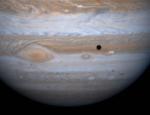 Jupiter, Io, and Shadow
Jupiter, Io, and Shadow
7.12.2002
Pictured above is the innermost of Jupiter's Galilean satellites, Io, superposed in front of the gas giant planet. To the left of Io is a dark spot that is Io's own shadow. A solar eclipse would be seen from within the shadow spot on Jupiter.
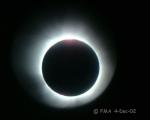 Zimbabwe Solar Eclipse
Zimbabwe Solar Eclipse
6.12.2002
Normally hidding from view in the glare of the Sun, the shy solar corona came out to play Wednesday as a total solar eclipse graced morning skies over southern Africa. This telescopic image...
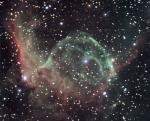 NGC 2359: Thor s Helmet
NGC 2359: Thor s Helmet
5.12.2002
NGC 2359 is a striking emission nebula with an impressive popular name - Thor's Helmet. Sure, its suggestive winged appearance might lead some to refer to it as the "duck nebula", but if you were a nebula which name would you choose?
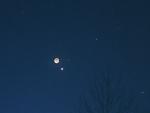 Moon, Mars, Venus, and Spica
Moon, Mars, Venus, and Spica
4.12.2002
Gliding toward today's total eclipse of the Sun, the crescent Moon has been rising early, just before dawn. And as a prelude to its close solar alignment, the Moon also completed a lovely celestial triangle, closing with bright planets Mars and Venus on the morning of December 1.
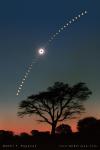 Eclipse Over Acacia
Eclipse Over Acacia
3.12.2002
On December 4th, for the second time in as many years, the Moon's shadow will track across southern Africa bringing a total solar eclipse to African skies. Reaching Africa just before...
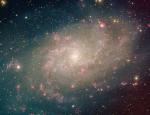 Nearby Spiral M33
Nearby Spiral M33
2.12.2002
Spiral galaxy M33 is a mid-sized member of our Local Group of Galaxies. M33 is also called the Triangulum Galaxy for the constellation in which it resides. About four times smaller (in radius) than...
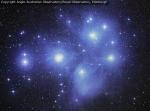 The Pleiades Star Cluster
The Pleiades Star Cluster
1.12.2002
It is the most famous star cluster on the sky. The Pleiades can be seen without binoculars from even the depths of a light-polluted city. Also known as the Seven Sisters and M45, the Pleiades is one of the brightest and closest open clusters.
 Surveyor Hops
Surveyor Hops
30.11.2002
This panorama of the cratered lunar surface was constructed from images returned by the US Surveyor 6 lander. Surveyor 6 was not the first spacecraft to accomplish a soft landing on the Moon ... but it was the first to land and then lift off again!
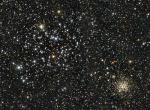 Open Star Clusters M35 and NGC 2158
Open Star Clusters M35 and NGC 2158
29.11.2002
Open clusters of stars can be near or far, young or old, and diffuse or compact. Open clusters may contain from 100 to 10,000 stars, all of which formed at nearly the same time. Bright blue stars frequently distinguish younger open clusters.
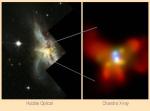 The Supermassive Black Holes of NGC 6240
The Supermassive Black Holes of NGC 6240
28.11.2002
The Hubble optical image on the left shows NGC 6240 in the throes of a titanic galaxy - galaxy collision 400 million light-years away. As the cosmic catastrophe plays out, the merging galaxies spew forth distorted tidal tails of stars, gas, and dust and undergo frantic bursts of star formation.
|
January February March April May June July August September October November December |
|||||||||||||||||||||||||||||||||||||||||||||||||